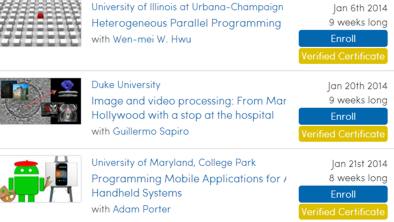| Computer Science MOOCs For The New Year |
| Written by Sue Gee |
| Friday, 03 January 2014 |
|
The New Year is a time for taking stock and adopting new resolutions and making plans. After covering scores of MOOCs in 2013 what does 2014 have to offer. MOOCs have generally had a mixed press during 2013. They have been criticised for not meeting the expectations that many people had for them of solving all the problems of higher education. Perhaps it was the inflated expectations that were to blame and not the ideas or ideals of Sebastian Thrun, Andrew Ng and Daphne Koller who with Udacity and Coursera have provided courses that we at I Programmer still consider will help both new and existing developers gain useful skills. And perhaps this is the difference - the I Programmer team considers MOOCs from the point of the the individual consumer whereas the main critics have been looking at the role of MOOCs in replacing or bolstering traditional higher education. The critics point to the very high drop out rates for MOOCs. However, as consumers the fact that as the courses are free there is little penalty for dropping out. We can enrol, take a look at what is on offer and walk away if it we decide not to stay the course. There will be many reasons for dropping a MOOC - too easy, too difficult, too time-consuming or just because it's a mismatch with out requirements. In some cases a MOOC might not be well taught - and given that an alternative might come along in a few months why not wait for something better. Having stayed the course for some MOOCs that were not well taught it is a bit disturbing that there is a great deal of peer pressure not to criticize, or even question, poor teaching. That is something that needs to change - even though MOOC instructors have obviously put in a lot of effort and time, if they are confusing students rather than clarifying a difficult subject they need to be criticized - see it as constructive criticism if it makes you feel better. One of the factors that can save a poorly taught course is that currently many of them attract participants who already know a great deal about the subjects being taught. They are therefore able to help out others who are new to the material. Unfortunately this is perceived as yet another shortcoming of MOOCs - that they attract already well qualified students who are topping up or updating their existing skills! Udacity has a new strategy to try to retain students which is referred to as "the full experience" for which students pay at a rate of $150 during the full period of study even though they can still go at their own pace. It is also important to note that if you don't want extra support from a personal coach who will review code and give guidance on project work, you can still access the course content for free. Introduction to Hadoop and MapReduce, which we previewed in November is one of the first to offer the "full experience" extras when it restarts this month and it is joined in the new data science track by Introduction to Data Science. If you sign up now you can take advantage of a 30% early registration discount on both of these, reducing the cost to $105 per month. Similarly the 30% discount option is being offered for Introduction to Salesforce App Development. edX is also offering extra support to students who choose the Certificate Option at a cost of $350 for the already established Harvard MOOC CS50x: Introduction to Computer Science. The benefits include being able to interact with teaching assistants in discussion forums and participate in virtual group office hours with the instructor and if your work is satisfactory, you'll receive a CS50 Certificate and a $350 voucher toward a course at Harvard Extension School. Coursera offers Verified Certificates for some of its courses but there's no extra support - the benefit for paying around $49.00 is that, by providing photo id and competing the course with webcam monitoring the certificate you receive at the end verifies that you were actually the person who earned it. The following computer science courses with Verified Certificates start this month:
One of the new feature offered by Coursera is an easy way to include your achievements on LinkedIn - irrespective of whether your certificate is verified or unverified. Some students can be motivated to persevere with a course simply be offering them badges. Open2Study, which offers short (4 week) and relatively low level introductions to a wide range of topics relies on badges as well as certificates. Two new courses that are included in its schedule this month are The Art of Photography and Mobile Robotics. More Information
Related ArticlesUdacity Introducing Big Data Courses and Paid Enrollment December Computer Science MOOCs and Online Courses Back To MOOC - September's Computer Science Courses
To be informed about new articles on I Programmer, install the I Programmer Toolbar, subscribe to the RSS feed, follow us on, Twitter, Facebook, Google+ or Linkedin, or sign up for our weekly newsletter.
Comments
or email your comment to: comments@i-programmer.info
|
| Last Updated ( Friday, 03 January 2014 ) |



